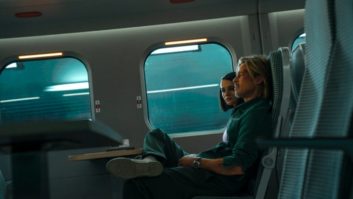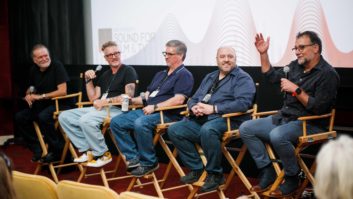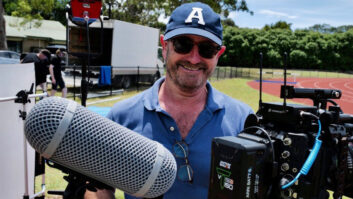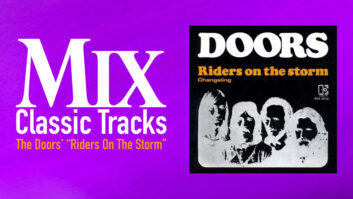Train’s singer — and newly commissioned trumpeter — Pat Monahan is contemplating the differences between their 1998 self-titled debut and the recent Drops of Jupiter release. “From the beginning of recording this last record, the money that we spent and the fact that Brendan O’Brien did the recording and producing of it, that’s a big difference,” he says.
Having a real budget and a top-flight producer were just two of the key elements that contributed to Train making a smash CD and fulfilling the promise its supporters have predicted for some time. By the time the band’s tour bus pulled into Southern Tracks recording studios in Atlanta last year to cut the new album with O’Brien, they were already a group on the verge of major stardom. The group had grown from an acoustic duo playing San Francisco coffee houses to a full-fledged band, and from an unsigned act to heavy rotation stars, thanks to the catchy “Meet Virginia.”
In fact, the band was on the road touring to support that single when they started writing new songs. “It just seemed like it was time to make a record, naturally,” Monahan explains. So they went right from the road to the studio. “But we had another song that Columbia was about to release to Top 40 radio called ‘I Am.’ So, we came in, recorded, wrote, pre-produced the whole thing in about two months, and then went out and toured ‘I Am,’” he says.
Writing on the road influenced each of the songs on the new album, explains Monahan. “The only time we had on the road to write was at soundchecks,” he says. “We’d just get together and put down whatever creative thoughts and ideas we had musically.”
“We didn’t go home and sit in our rooms, play guitars and write songs, and get together and rehearse it,” reports bassist Charlie Colin. “We were listening to all these tapes of all these soundchecks, so the album was all written out of jams, which was different than the first record.” It was also a new strategy to have the entire band contribute to the songwriting.
While their debut was self-produced, with help from Matt Wallace and Counting Crows’ Dave Bryson, who mixed the album, the band wanted to work with Brendan O’Brien this time around. “We asked Brendan to see us in San Francisco,” Monahan recalls. “It was pretty amazing that he was available. I think it’s rare that he’s available.” In fact, at first O’Brien’s management passed on working with Train, until the producer remembered “Meet Virginia” from the radio. “He flew to San Francisco to see what we were writing,” Monahan says. “We felt like we were on our way to making a good record. We were probably at 10 or 12, actually we may have had 14 ideas. Some of them were farther along than the others. He came in and said, ‘Man, these are great starts. This is what we need. Let’s make a record.’”
While the notoriously press-shy producer and his engineer Nick DiDia declined to be interviewed, Monahan reports O’Brien was a great leader in the studio. “He’s able to get the best out of everybody,” he says. “There’s a lot he has to offer. He’s an incredible musician and songwriter, so he knows how to keep things going in that way. He brought a lot of those things to the record when we needed that.”
One of the things O’Brien brought to the sessions was a sense of confidence and freedom in each of the bandmembers, explains drummer Scott Underwood. While the band was writing the song “Mississippi” on the road, Underwood started thinking about working in a percussion loop and keyboard part — both were new ingredients in the Train sound. So he programmed a trance-like drum groove on a Roland 505 Groovebox and brought that into the studio. “We said, ‘Man, we want to use these loops.’ [O’Brien] liked the idea. We did all the tracks, and after a while, I started thinking that maybe the Groovebox isn’t the right way to go. Maybe we should manually make real loops where I would do a bass drum part with a mallet.” O’Brien and engineer Nick DiDia recorded two bars of the bass drum part and then Underwood tapped a snare with his finger. “That song is my favorite tune on the record because I love trance and I love that quality of drumming where there’s a continual loop,” Underwood says.
Monahan was curious about using loops, but not convinced. “I wanted to hear them,” he says. “I really want to take advantage of technology, but I don’t want to date our records. That’s a hard place to go, making it so it’s not dated, but also keeping it fresh and taking advantage of what is available.”
Where Underwood had a chance to add his programming talents to the album, bassist Colin added his own flavor to the songs. “I felt very busy on this record in a great way,” he says. Then he points to “Getaway,” a tune where he played with a number of bass pedals such as a Big Muff and a wah-wah. He also took advantage of the bevy of effects and amps that O’Brien had at Southern Tracks. “On every song, we would just dial in one or two or three sounds and get some stuff live. Train has a much more dynamic spectrum sonically than it did on the first record,” he explains. “It’s still raw and real, but at the same time I did get some really fun sounds. There are times where I’m playing much more higher-frequency melodic stuff, like upper-octave parts.”
Not wanting to be the only bandmember who didn’t have a series of instruments listed next to his name, Monahan added trumpet to the song “Mississippi.” “That was a big dream-come-true type of deal,” he says. “I just started playing that thing a few years ago and man, I’ve played some bad trumpet onstage! Playing a muted trumpet is a lot more difficult than just playing an outright trumpet. So to get a good result was really a positive experience for me. You can always hire somebody, but it’s so much fun to give it a shot yourself.”
Though there are programming touches and trumpet and string overdubs, the album was largely recorded live in the studio’s central tracking room on 48-track analog. The whole band played at once, without headphones, through a P.A., for that extra “band” feeling. Some solos were performed during the tracking; others were added later. The strings were recorded at Ocean Way in Nashville and Capitol in Hollywood.
Interestingly, the band was set to release the album without the title tune and “Hopeless.” “Drops of Jupiter’ was not written in the beginning,” Monahan reports. “It kind of took over as the song that was to describe the record.” Indeed, with its dramatic dynamic shifts, its powerful lead vocals and blend of rock instrumentation, and its tastefully arranged strings, the band has come up with a moving power ballad that has connected with millions of people and shot the group’s career into the stratosphere. MTV and VH-1 can’t seem to get enough of the song and telegenic band; the song and album are shaping up as one of the surprise hits of the year.
But just two albums in, Monahan isn’t looking to live off the Train legacy quite yet. “Right now, I just want to have a career; let’s just go with that right now. We can figure out all the rest later,” he says with a laugh. “I would like to have what they call a discography. We don’t have one of those yet.”
They did, though, get a taste of the quintessential rock lifestyle while they were making Drops of Jupiter. “We got on a rented Lear jet and flew from Atlanta to Nashville to put a string section down with a big orchestra,” Monahan says. “That was on the song ‘Something More.’ Getting into a plane with a bunch of guys to go have an orchestra play on one of your songs is a pretty great rock ‘n’ roll moment.”







